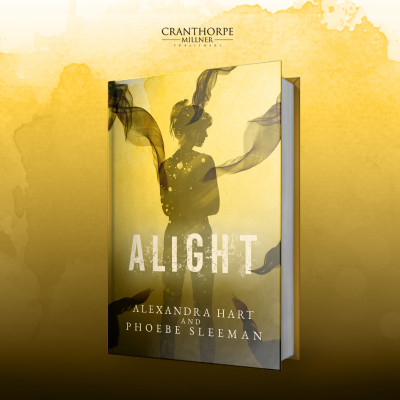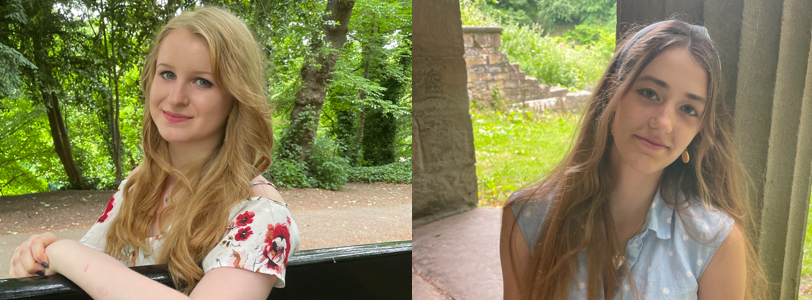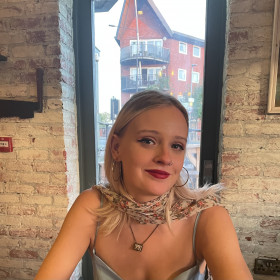It is the stuff of dreams, but Alex Hart and Phoebe Sleeman, have managed to have their first novel, ‘Alight’, published. The idea for their fantasy novel first came to them at the age of twelve, and since then have been developing their story. Not only are they co-authors but close friends. I spoke to them to gain an insight into ‘Alight’ and their writing partnership.
First of all, I wanted to say congratulations on getting your first book published! How are you feeling?
Phoebe: It’s kind of crazy. I think it really does feel like a dream moment. I don’t think our twelve-year-old selves would be able to believe it.
Alex: It all feels really surreal. I’ve had friends text me saying their copies have been dispatched or been told by Waterstones that their copy is on its way. Surreal is the only word.
Are you going to go to Waterstones when it comes out to have a look at it?
Alex: Yeah, so on Tuesday, which is the official publication date, we’re going to meet at Phoebe’s house and open it together. But we’ve got a couple of different events booked. So we’re going to go to libraries, our official launch event is on a Tuesday evening, and then we’re going to go to a couple of schools, and we have a book signing in Waterstones.
So, talk me through the process of writing the book. How long did it take? Did you have any difficulties?
Alex: When we were twelve, we were in the back of a PE class, probably not paying enough attention as we should have been, and we started chatting about various ideas we had about magical worlds. Phoebe had been playing a game all weekend with her family friends, and they had created this whole alternative reality that we would talk about. I also have a little birthmark on my arm [that] my parents always told me was magic. We started talking about these ideas, and we decided we should write a book about this!
It went really slowly at first, but once we hit lockdown, and we had our A-Levels cancelled, we had about six months before we were due to start University. We thought this would be the perfect opportunity to actually write the rest of this book.
Phoebe: We spent lockdown just writing this together, splitting up the plot, so we had different sections to write. Alex would do a couple of hours in the morning, then go out for your once a day walk, and it was just a really lovely time. I think we finished it around July, and then we sent it out to some of our family and friends. Then we did our first edit after they had read it, and around October, we started to send it out to publishers.
The co-author element is so interesting. Was that difficult? Were there fights for creative control?
Alex: I don’t think we’ve ever fought. Our book has three different narrators, which is really helpful because Phoebe has primarily written one of them. I wrote the second, and then we both collaborated on the third. We were trying to portray different ways of talking through each narrator. It was definitely a negotiation when it came down to the nitty gritty language bits. In terms of motivation, we’ve definitely driven each other on. The compromises we came to were better than any of our original ideas. It’s actually been nice that our friendship hasn’t become all about the book; it's not the only thing we ever talk about. The book has also grown alongside the friendship. I couldn’t have written it alone.
Can you give me a brief synopsis of the book?
Phoebe: So our one-liner is: Emelie Lewis has always had an overactive imagination, but even she couldn’t dream of the magical world she is a part of. It’s about this girl who goes to stay with her great aunt over the summer, and she’s very imaginative like we were. She tries to look for an adventure and accidentally stumbles upon them.
Alex: She discovers she is part of this magical world, and in this magical world, your magical power is based [on] which month you are born. There are twelve magical powers, and each one is very different. The idea behind that, especially as we were writing it growing up, is that we don’t all have to have the same strengths and weaknesses. This became relevant when we were thinking about how to include diversity in our book; it was really important that all children could find themselves in it. Writing it over the summer of 2020 with the BLM protests, we realised that we had written what we knew. The point of the book is that differences are what make you strong. We also wanted to make sure when we were going through the editing process to include characters from other backgrounds and not just make them tokens either.
Definitely. So you said there are three different perspectives, are they three different characters?
Alex: We can tell you two of them! So one is our protagonist, Emelie, and the other is her cousin, Alphie. He speaks as if he has swallowed a dictionary which was really fun for us to write and hopefully educational. At the back of our book, we have a list of Alphie-isms, which is a dictionary of all of the ridiculously long words he uses. The third narrator is written by someone looking over Emelie, but you don’t find out who they are until much later in the book.
Phoebe: We originally only wrote it with two, Emelie and the narrator, but as we were writing it, we realised Alphie needed to speak too. We added him in slightly later which is an interesting dynamic within it.
How much has the book changed then from the original idea?
Alex: It isn’t very different from the original plan. The shape of the story is very similar, but when we came back to editing it as 18-year-olds, we wanted to get rid of a lot of the fairytale stereotypes. This was actually quite hard to do because we’d grown quite attached to them, and we realised we should probably let them go. You know the things like the baddies having physical signs as well as behavioural signs of being evil. As we grew older, the main things that changed were the details because it’s classed as low-fantasy that exists in the world that we know, rather than a Lord of the Rings alternative reality. We wanted to get that sense of realism.
Phoebe: I think, in a way, our protagonist's reaction to things changed as we grew up and went through being a teenager and dealing with all the confusion and hard feelings that that entails. I feel like Emelie, to begin with, was fully good, but she’s now good in a real way. She is somebody that, hopefully, children will be able to empathise with and feel validated by; it’s okay to be sad and confused and feel all of those things.
Alex: We’ve definitely made the good characters flawed, and the bad characters have snippets of good in them.
Are imperfect characters one of the most important messages you want to convey to kids reading this book?
Phoebe: It is one of the most important, but we have quite a few different messages. This book is dedicated to every twelve-year old who has a dream. I think we secretly dreamed that this would be published when we were that age, but we didn’t quite realise this would be a reality.
Alex: The messages in the book don’t just come from the plot but also the development process of the book. There is a lot in there about friendship because we were writing it together and an emphasis on determination, which is something we wanted to drive home, especially in the way we are talking to people about it. I remember an author who came in to talk to us in school, and she really inspired me. It wasn’t so much her book, but the way she talked about it and showed it was important to her. We want to show that Phoebe and I aren’t special, we are ordinary humans that stuck to it. The fact there is something magical in all of us is driven home by the plot of the book.
That’s an inspiring message, hopefully kids in 10 years will be talking about you in the same way. Who do you look up to?
Phoebe: I have a really great book called ‘Letters to a Young Writer’ by Colum McCann. It’s just a beautifully written book which you want to read aloud because it's so beautiful. He also has a lot of wisdom. If I ever feel that I don’t want to write, I get out that book.
Alex: I was a big fan of Eva Ibbotson. Phoebe and I were a fan of the Enid Blyton stories of the world, which is what we had to fight against the book becoming. Even though the book has nuance, I’d still like to think it has that romanticised classical magic in it. A combination of what we used to look up to and what we began to look up to when we got older.
Do you see yourself continuing writing children’s books in the future, writing together, or do you think you will move into adult fiction or writing separately?
Phoebe: I think we have a lot of ideas within this world. I’d love to keep writing with you, Alex. We both have had different ideas and have written historical fiction, but I personally need Alex to motivate me to write.
Alex: I agree. We have had ideas for a sequel or a prequel, so would like to continue writing in this world. I need Phoebe to make sure the writing is good, which is why we work so well together. Even if we move into other genres in the future, historical fiction or adult novels, I think our partnership would remain no matter the genre we worked in. There’s something different about writing with a friend. I don’t know if it’s the assurance or joint brainpower, but I think there is something else that pushes us.

‘Alight’ will be released Tuesday 28th March.









0 Comments